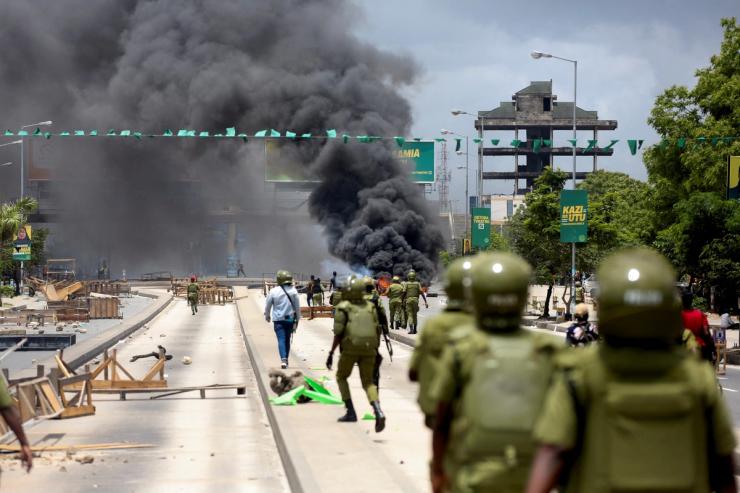The Scoop
Election violence in Tanzania that opposition groups say left hundreds dead is damaging investors’ confidence in East Africa and hampering regional trade, Kenya’s trade minister told Semafor.
Protests broke out during last Wednesday’s election over the disqualification of President Samia Suluhu Hassan’s main challengers. Samia, who was sworn in for a second term on Monday after it was announced that she won 98% of the vote in last week’s vote, has faced criticism from opposition groups over alleged human rights abuses. The main opposition Chadema party said it has documented hundreds of deaths in the protests. A report by the Southern Africa Development Community’s electoral observer mission (SEOM) concluded that “in most areas, voters could not express their democratic will.” It also noted “very low” turnout and “a tense and intimidating political atmosphere”, with heavy deployment of security officers.
Kenya’s Trade Cabinet Secretary Lee Kinyanjui, in an interview, said electoral tensions in Tanzania were “impeding movement and curtailing investor confidence” in the East African Community economic bloc. “We hope the situation is a one off incident that does not reflect the future of the region,” he added. The situation, he said, was having “a direct impact on the smooth flow of trade and investment in the region”.
In this article:
Know More
Tanzania is one of Africa’s fastest growing economies and has maintained strong economic growth over the past decade, driven by an expansion of key sectors including agriculture, mining and tourism. Government reforms to improve the business environment and public investment are projected to help the country grow its economy by 6% in 2025, but the fallout from the elections risks jeopardizing this trajectory.
Trade has been significantly disrupted in East Africa by protests in Tanzania and the country’s internet blockade which began on the day of the polls last week on Wednesday. Data from Netblocks shows internet access coming back online on Tuesday this week. Tanzania’s main Port of Dar es Salaam remains shut down after workers were ordered to stay at home, causing several shipping lines to redirect their vessels to the Port of Mombasa along Kenya’s coast. The Shippers Council of Eastern Africa, a private sector lobby group representing importers and exporters in the region, has warned of logistical complexities, delays and congestion as they reroute their vessels to Mombasa. Several trucks moving goods between Tanzania and Kenya have also been stranded at key border points of Isebania and Namanga.
Additionally, remittances into Tanzania have been blocked due to the internet shutdown. Inflows remittances into Tanzania hit $758 million last year, with the government targeting an increase to $1.5 billion by 2028 through closer engagement with Tanzanian workers overseas. Both the UK and US in separate travel advisories warned of shortages of cash, fuel and food in the country following the unrest.
Kinjanjui said other East African countries needed to undertake efforts to avoid similar scenarios, noting their economic interdependence. “In a regional bloc where raw materials from one country fuel industries in another, the need for sustainable peace is critical,” he said.
Step Back
Samia was sworn in on Monday at a private ceremony at a military facility in the city of Dodoma in central Tanzania, attended by dignitaries including the Presidents of Zambia and Burundi.
Videos shared to social media showed numerous dead bodies on the streets of cities including Dar and Mbeya. A security crackdown is feared to have left hundreds dead, although details remain unclear due to communication challenges associated with power outages and the internet shutdown. A mass text message sent by police this week warned Tanzanians against sharing images or videos that may “cause distress or degrade someone’s dignity”.
Kenya’s President William Ruto and his Ugandan counterpart Yoweri Museveni both faced criticism for congratulating Samia on her election, as did African Union (AU) chair Mahmoud Ali.
In his statement congratulating Samia, Ruto encouraged “all political actors and stakeholders to embrace dialogue and tolerance as they seek to resolve any issues at hand.”
The View From A Sociologist
Herman Manyora, a political analyst and professor at the University of Nairobi (UoN), argued the unrest could have a long term impact on investor confidence in Tanzania which has long been reputed for its peace and stability. He said the uncertainty surrounding Samia’s current term would cause investors to adopt “a wait-and-see approach.” Manyora added that Tanzania, as well as its neighbours including Kenya, could be primed for future unrest due to high youth unemployment coupled with alleged human rights abuses — all of which may combine to push investment away.
“Long term decisions by business people will be affected,” he said. “There are people who believe this thing will take a long time to resolve, and that Samia Suluhu and the Tanzanian government are unlikely to enjoy a peaceful rule.”
He said that Tanzania also faced the challenge of creating enough jobs for its large youthful demographic amid growing frustration with the government, drawing parallels with Kenya’s recent youth-led protests. Manyora noted that Samia herself had previously said instability in a neighboring country due to protests, thought to be Kenya, was driving investors to Tanzania. “Now, they are doing the same,” he said.
Notable
- Reports suggest relative calm returned to Tanzania’s commercial capital of Dar on Monday following days of protests. A dusk-to-dawn curfew remains in place.


